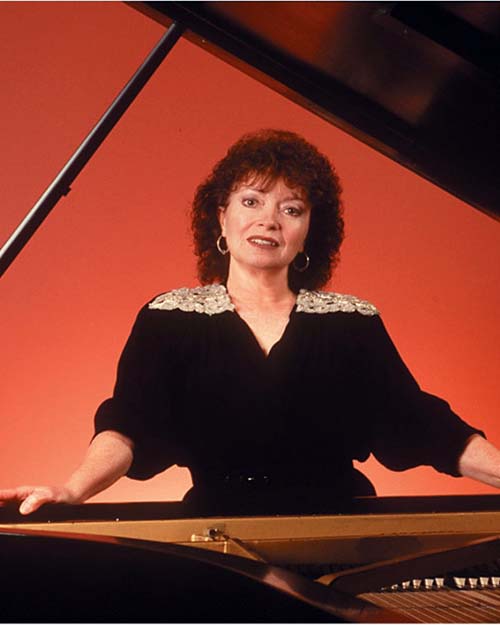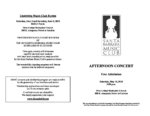Image: Betty Oberacker
On Saturday, May 19 at 3 PM, the Santa Barbara Music Club presents a free concert at First United Methodist Church, 305 East Anapamu at Garden, Santa Barbara.
This concert features pianist Betty Oberacker performing Mozart’s Sonata in B-flat Major, K.333 and Adagio in A Minor, K. 511, followed by Prokofiev’s Sonata No. 7 in B-flat major, Op. 83 (“Stalingrad”).
This concert has been generously sponsored by Jane Ramsay in memory of her husband, William Ramsay
Program Details
This concert has been generously sponsored by Jane Ramsay in memory of her husband, William Ramsay
Notes on the Program
The concert opens with the vibrant Sonata in B-flat major, K. 333 of Wolfgang Amadeus Mozart, one of his most beautiful and challenging keyboard works. Composed in 1783, it is called the “Linz” Sonata as Mozart wrote it specifically to premiere at a concert in that Austrian city, and it subsequently became a favorite of his to perform. The first movement, “Allegro,” features a dazzling interplay of melodic inspiration, together with bravura passagework enhanced with delicate filigree. The central movement, “Andante cantabile,” is clearly influenced by Mozart’s experience as an opera composer, and its intimate lyricism may justifiably be compared with those of his most touchingly poignant arias. The “Allegretto grazioso” final movement bears distinct concerto influences, including an opening theme that alternates between “solo” and “orchestral” effects, and is replete with a pseudo-improvised cadenza.
Mozart’s Rondo in A minor, K. 511, composed in March of 1787, bespeaks a profound change in the cheerful and successful life of the composer: when formerly his pianistic and compositional virtuosity was acclaimed by the Viennese nobility, it now was beginning to be met with lack of understanding and even displeasure at its bold digressions from the traditional. The opening measures of this elegant work reveal an impassioned yet anguished undercurrent that is maintained throughout the entire composition: Mozart is no longer merely exposing a myriad of exquisite ideas, but rather striving to display their underlying moods. The keyboard writing, too, has changed, with the style now being more reminiscent of his late string quartets and quintets.
It should be noted that Mozart used the A minor tonality in a piano composition only one other time — in his Sonata K. 310, which he composed in May of 1778 after receiving news that his mother had passed away. It is intriguing to conjecture as to the events that prompted this reprise.
In stirring opposition to the above, the concert ends with Serge Prokofiev’s powerful Sonata No. 7 in B-flat major, Op. 83 (“Stalingrad”). Composed between 1939 and 1942 and completed and premiered during the Battle of Stalingrad — the Red Army’s defense of that city – the music gives insight into the turbulence and extreme contrasts that must have been experienced during that period. The opening “Allegro inquieto” (restless, uneasy Allegro) immediately conjures up the agitated, intense, and unexpected histrionics which permeate the movement. The ensuing “Andante caloroso” (warm Andante) diverges impressively, as if to soothe the preceding choppiness with a marvelously smooth and romantic tone, almost unctuous in its leisurely progressions. The “Precipitato” (rash and hasty) designation for the Finale is a precise description for that toccata-like movement, a perpetual motion of incessant tension; in 7/8 meter, the propulsive rhythmic patterns proceed inexorably toward the impending climax.
— Betty Oberacker
NOTES ON THE PERFORMER
Betty Oberacker is internationally acclaimed for her interpretations of both traditional and contemporary solo and chamber music repertoire, and has toured throughout Europe, Israel, Asia, Australia, New Zealand, Mexico and the U.S., including performances at Carnegie Hall, Kennedy Center, the Amsterdam Concertgebouw, Berlin Philharmonic Hall, London’s Wigmore Hall, and the Vienna Musikverein. Renowned for her interpretations of both traditional and contemporary repertoire, she has been Artist-in-Residence at 55 universities, conservatories and music festivals worldwide, and many prominent composers have dedicated their works to her.
Her discography includes Bach’s Well-Tempered Clavier (Clavier Records), A Bach Commemorative Recital (MIT Great Performances Archives), Chamber Music of Emma Lou Diemer (Orion), Schoenberg’s Pierrot Lunaire (Century), John Biggs’ Variations on a Theme of Shostakovich (VMM), and Emma Lou Diemer’s Piano Concerto, with the latter two composed for Oberacker. Her appearance with the National Symphony Orchestra in the East Coast Premiere of the Diemer Concerto elicited a standing ovation from the Kennedy Center audience, and she recorded a CD of the work in Prague for MMC Recordings.
Born in Cleveland, Ohio of German-Romanian parentage, her musical gifts were evidenced at age three, when she began to play the piano, accompany and improvise entirely by ear. Piano and theory lessons started at age seven, and at nine she was accepted on scholarship as the only child student of the noted pianist and pedagogue Beryl Rubinstein. Her BM and MM Degrees are from the Cleveland Institute of Music, and she earned her DMA Degree from The Ohio State University while concurrently a member of the piano faculty.
Honors accorded her include a Fulbright Performing and Research Fellowship to Italy, grants from the Interdisciplinary Humanities Center and the Pacific Rim Research Centers, awards from the University of California Institute for Mexico and the United States (UC MEXUS), and the University of California Distinguished Teaching Award. Many of her students hold positions as solo and chamber music performers and teachers in the United States, Europe, and Asia.
Dr. Oberacker is a distinguished Artist-Teacher and UCSB Professor Emeritus, and enjoys an active performing, teaching and chamber music coaching schedule. She is a current board member of the Santa Barbara Music Club, member of the Concert Committee, and former chair of the Concert and Scholarship Committees.
The Performer
Betty Oberacker, pianist, is internationally acclaimed for her interpretations of both traditional and contemporary solo and chamber music repertoire, and has toured throughout Europe, Israel, Asia, Australia, New Zealand, Mexico and the U.S., including performances at Carnegie Hall, Amsterdam Concertgebouw, Berlin Philharmonic Hall and Vienna Musikverein. She has been Artist-in-Residence at 55 universities, conservatories and music festivals worldwide, and many important composers have dedicated their compositions to her. Her musical gifts were evidenced at three, when she began to play the piano and compose entirely by ear. Piano lessons started at age seven, and at nine she was accepted on scholarship as the only child student of the noted pianist Beryl Rubinstein. Her BM/MM Degrees are from the Cleveland Institute of Music, and her DMA Degree is from Ohio State University, where she was concomitantly a member of the piano faculty. Her discography includes Bach’s Well-Tempered Clavier (Clavier Records), A Bach Commemorative Recital (MIT Great Performances Archives), Chamber Music of Emma Lou Diemer (Orion), Schönberg’s Pierrot Lunaire (Century), John Biggs’ Variations on a Theme of Shostakovich (VMM), and Diemer’s Piano Concerto (MMC), the latter two works composed for Oberacker. Honors accorded her include a Fulbright Research Fellowship to Italy and the University of California Distinguished Teaching Award, and her students hold important positions as performers and teachers in the U.S., Asia and Europe. Dr. Oberacker is UCSB Professor Emeritus, and enjoys an active performing, teaching and chamber music coaching schedule.




